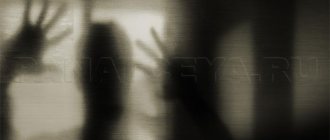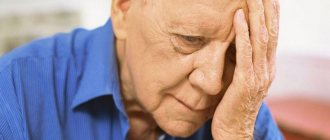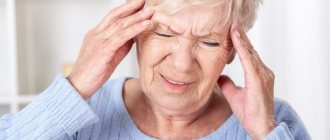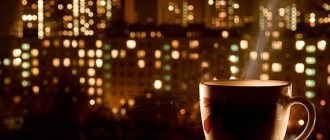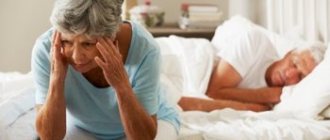27.01.2021
In old age, healthy sleep means a lot; an old person needs balanced rest, a comfortable sleeping place and a normal daily routine. However, as practice shows, many pensioners stay awake at night, suffer from insomnia or do not get enough sleep due to psychological disorders. The reasons for this condition can be varied - stress experienced the day before, pain that worsens at night, or specific diseases that should be treated by specialists.
Causes of sleep disorders in the elderly
At night, many older people experience a feeling of anxiety and restlessness, succumb to internal experiences, analyze their day, feel sorry for themselves, and remember their untimely departed friends and relatives. All this affects the quality of rest - old people fall asleep for a long time, often wake up and sometimes even walk at night, staying in the “kingdom of Morpheus”.
Insomnia can be caused by:
- incorrect daily routine - often retirement leads to the fact that a person stops following his usual schedule, goes to bed late and is in no hurry to get up in the morning;
- lack of physical activity - old people simply do not expend accumulated energy and do not have time to get tired;
- diseases accompanied by pain - chronic pain, neurological diseases, pathologies of the cardiovascular system prevent a pensioner from sleeping if they are not treated;
- depression – problems that accumulate like a lump, leading to chronic lack of sleep;
- long-term use of sleeping pills – long-term therapy with sedative medications does not make them effective, reduces their effectiveness and triggers the opposite effect;
- conditions that require improvement - unsuitable humidity, temperature, lighting, uncomfortable mattress, too warm or cold blanket, high pillow negatively affects the comfort of the sleeping person;
- life's troubles, stress, unpleasant events do not allow you to relax and fall asleep quickly;
- high blood pressure, snoring, tachycardia, poor cerebral circulation and other somatic diseases in people over 60 years of age negatively affect the quality of rest of an elderly patient;
- senile dementia, Parkinson's disease, Alzheimer's disease, etc.
It is difficult to fall asleep after a heavy dinner; insomnia often accompanies those who do not go to bed on an empty stomach. Contrary to the popular belief that alcohol accompanies relaxation, drinking alcohol excites the nervous system and interferes with proper rest in old age.
Other remedies for insomnia
What else helps with insomnia besides medications and traditional methods? There are a number of non-standard methods that you can use to fall asleep faster.
Music and sounds of nature
Music is an excellent remedy for insomnia.
It helps to calm down, slow down physiological processes and get restless thoughts out of your head. When choosing music “for sleep,” you should give preference to calm compositions at a slow tempo with a small number of changes in dynamics: changes in volume and sound strength. But punk or heavy metal is not the best choice for listening to at night. Aggressive and fast compositions are unlikely to put you to sleep. How does music affect our consciousness? There are two aspects: Breathing and heart rate are synchronized with the slow tempo of the “sedative” composition: in this way you smoothly switch off your body and fall into sleep. Focused listening allows you to take your mind off negative thoughts and forget about worries.
Another effective cure for insomnia is listening to nature sounds before bed. The natural repertoire is very diverse: in online music libraries you can find both the standard “murmur of a stream” and “birdsong”, as well as the more extraordinary “crackling of a fire on the bank of a forest stream” or “the sound of a snowstorm in the mountains.” You can find such recordings, for example, on the YouTube channel Relaxing Soundzzz or TheSilentWatcher.
Meditation
Meditation will help you cope with severe mental fatigue, which often causes poor sleep. Meditation techniques will help restore emotional balance and relax muscles. With their help, it will be possible to prepare the body for a deep dive into healthy sleep. You need to properly prepare for meditation:
- Provide access to fresh air into the room.
- Take care of the soundtrack - choose music that will help you relax.
- Take a comfortable position.
There are many relaxation techniques available, so you are sure to find something that suits you. Let's give some examples.
Mindfulness Meditation
Sit comfortably and close your eyes. Imagine a place of power - a place where you feel calm and peaceful. What gives you strength? Mountains or ocean, forest or river - choose what is closest to you. Breathe slowly and deeply, trying to immerse yourself in the picture created in your imagination. Don't let extraneous thoughts disturb your peace. When you feel that you have calmed down, end the session. Thank yourself for the time you took for yourself.
Breathing Meditation
When you are ready for bed, sit on the bed in the lotus or half-lotus position. Straighten your back, place your hands on your knees and close your eyes. Breathe deeply and measuredly. When extraneous thoughts come, gently note them, but do not allow yourself to reflect. Return your attention to your breathing. After 10 minutes you will calm down, and after 20 you will feel drowsy. Go to bed as soon as you want.
Muscle contraction
Alternately tense and relax your muscles to speed up blood circulation and help the body replenish and recover. Start with your feet: clench and unclench your fingers for 10-15 seconds. Gradually move to your calves. Continue this way throughout your entire body.
Yoga
Yoga can help you get rid of stress, improve the quality of your sleep and cope with insomnia. To practice this technique, it is not at all necessary to go to the studio - “sleeping” asanas can be done at home before bed.
We bring to your attention the simplest and most effective exercises:
Sukhasana (seated forward bend)
Sit on the mat, cross your legs and lean forward with your arms extended. Try to reach your elbows to the floor.
Uttanasana (standing forward bend)
Stand on the mat, place your feet at a distance of 15 cm from each other, lean forward and, with your arms outstretched, clasp your ankles with your palms. If stretching doesn't allow it, bend down as low as you can. Freeze in this pose for 30-60 seconds.
Balasana (Child's Pose)
Sit on your knees and lean forward, pressing your forehead and hands to the floor. Take slow, deep breaths.
Halasana (plow pose)
Lie on your back with something soft under your shoulders - a towel or pillow. Do a “birch” and then slowly lower your legs behind your head. Either extend your arms along your body or hold your back with them.
Savasana (corpse pose)
Lie on your back, stretch your arms along your torso and relax. Try to get rid of all negative thoughts.
Aromatherapy
With the help of aromatherapy techniques, you can successfully cope with insomnia that manifests itself as a result of stress, emotional stress and psycho-emotional overload. The most common methods are air aromatization, aroma baths and aroma pendants.
Which aroma oils to choose?
- Chamomile, lavender and neroli oils are suitable for complex treatment of sleep disorders.
- Benzoin is suitable for those who cannot fall asleep due to too much responsibility or unpleasant events that happened during the day.
- Sleep disturbances caused by depression can be relieved by sage and bergamot oils.
- Rosemary, orange, frankincense, bay and basil will come to the aid of those who suffer from chronic insomnia.
- Rose oil will relieve nightmares.
- And the aromatic oils of mint, laurel and fennel will cope with feelings of loneliness and misunderstanding.
Pillows
Can't sleep for a long time? Do you often toss and turn in your sleep and cannot choose a comfortable sleeping position? You might just need to change your pillow!
How to choose the “right” pillow? Let's talk about the most important parameters.
- Size. If you prefer to sleep on your side, a high pillow will suit you; if you prefer to sleep on your back or stomach, a low pillow will suit you. For those who constantly toss and turn, it is optimal to choose something in between.
- Textile. Cotton and silk are the best fabrics for pillows. Also, when choosing, the density of the material is important: thin fabric is less durable and very soon filler particles will begin to come out through it, which can negatively affect your comfort and health. Therefore, preference should be given to dense materials that will not only effectively prevent the penetration of down or feathers, but will also smooth out the heterogeneity of the filler.
- Filler. Here are some examples of pillow fillings that you should give preference to:
- swansdown;
- sheep's wool;
- buckwheat husk;
- field herbs.
- Elasticity. To determine the quality of a pillow, perform a couple of simple tests. First: Press down on the pillow with your palm. A good pillow will regain its shape within 3-5 seconds. Second: lift the pillow by one corner and shake it. If it turns out to be half empty on one side, it means that no filler was added to it.
Symptoms of sleep disorders in the elderly
Therapy for insomnia is based on combating the symptoms of the disease, which requires careful diagnosis; drugs are selected based on an analysis of the general condition of the elderly patient. The disorder at a respectable age is manifested by the following symptoms:
- difficulties falling asleep, which you have to struggle with periodically;
- increased frequency of unpleasant dreams that make you wake up in a cold sweat with a feeling of fear, powerlessness, regret, accompanied by a rapid heartbeat;
- rest has become superficial, you often wake up at night, sleep lightly, are distracted by the slightest movement or rustle;
- waking up too early, inability to fall asleep again;
- You have to fight the signs of fatigue even after a full 8-hour rest.
Depending on the course of the disease and its symptoms, two types of insomnia are distinguished: transient - often caused by stress, recovery occurs on its own within 7-14 days; chronic – problems become regular, sleep disorders persist for more than 4 weeks; specific therapy is required to recover.
Forms of manifestation of insomnia
Insomnia affects the quality of life, makes a person irritable, nervous, and leads to serious psychological disorders. It is customary to distinguish three forms of unhealthy condition:
- Insomnia. The pathology is characterized by the inability to fall asleep, even if you manage to forget yourself, the rest is short and restless. Usually the condition is caused by psychological stress; eliminating the root causes leads to normalization of the daily routine. A psychotherapist should treat such patients.
- Hypersomnia. Unlike insomnia, a patient suffering from hypersomnia needs a long rest - from 12 to 22 hours. Even after almost a day's stay in bed, the feeling of vigor does not occur, the patient is unable to regain strength, looks tired, suffers from nervous excitement, or, on the contrary, looks disoriented and confused. The disease is diagnosed in people living in conditions of constant stress.
- Parasomnia. Sleep disorders occur in separate phases; a person has to get out of bed several times a night, often in a sleepy state. The cause of the painful condition is epilepsy, sleepwalking, urinary incontinence, phobias, pain during erection in men.
Based on the diagnosed form, appropriate therapy is selected, which is designed to normalize the daily routine of the elderly patient.
Treatment of senile insomnia at the Doctor SAN clinic
At the Doctor SAN clinic, we perform a broad diagnosis of sleep disorders before prescribing treatment for insomnia in older people. After a detailed interview, the doctor will determine the remedy suitable for a particular patient.
In the vast majority of cases of sleep disturbance in elderly and elderly people, the use of psychotherapy methods shows a good effect, and hypnotherapy sessions are also recommended for patients. And only if there is a special need, the doctor will prescribe a sleeping pill suitable for a specific situation.
If there is a suspicion of pathology of internal organs, additional examinations will be recommended. Here you can undergo ECG, EEG, ultrasound. Also in our clinic you can get advice from a therapist, endocrinologist, neurologist-epileptologist. If necessary, you can contact a somnologist and get a polysomnogram. In the vast majority of cases where sleep disturbance occurs in the elderly, treatment leads to a significant improvement in the patient's condition.
Traditional methods of treatment
Unlike traditional medicines, “grandmother’s” methods have no contraindications or side effects, are accessible to everyone and do not require large financial expenditures. Elderly people often resort to well-known recipes from the people:
- Valerian root. An effective, safe plant that has a pronounced calming and sedative effect. In accordance with the instructions, you should take the tincture or tablets for several weeks, since the active substance has a cumulative effect. However, some reviews say that the drug immediately relieves symptoms and makes it possible to sleep well on the first night after taking it. To mask the specific taste of valerian, it is recommended to drink the tablet form or take a tincture with mint essence to give the drink a more pleasant taste.
- A glass of milk at night. Grandma's old method is an effective way to set the body up for rest. The effectiveness of the method lies in the amino acid tryptophan, which is part of milk. The component helps the brain launch processes that switch the body into sleep mode. If you are not a big fan of milk or don’t want to drink liquid before going to bed, try eating some legumes, white meat chicken, and cottage cheese for dinner.
- Chamomile tea. Chamomile decoction is widely used in the treatment of insomnia and improving psychological well-being throughout the world. To enhance the effect, you can add a few drops of essential chamomile oil to your evening bath to overcome frustration, relax and tune in to the right atmosphere. It is recommended to drink herbal tea no more than 3 times a day; if desired, you can add honey to the drink.
In addition to traditional desktop activities that require the presence of two or more participants, old people are often carried away by their computer counterparts. Based on the results of recent studies, retirees enjoy spending time on the computer, mastering social networks, popular computer applications and simulators. Particularly popular among old people are “adventure games”, toys for logic, quick reaction and simple strategies. In this case, the computer allows you to maintain mental health, develop intellectual abilities, and prevent the occurrence of diseases of the nervous system. You can download any application to your computer; you can find free versions or inexpensive computer games.
The following herbal components are designed to combat sleep disorders: lemon balm, mint, lemongrass, parsnip, lavender, oregano, creeping thyme, sage, hops, celery root and others. Aromatherapy relieves sleep disorders. Inhaling the aroma of lavender or rose promotes relaxation; just drop a few drops on your pillow, light an aroma lamp, or fill your bedroom with the scent of incense sticks. In addition, reading a book in bed, meditation, and even calling a friend or close relative will help restore your routine.
Herbs that induce sleep
Many herbs can improve sleep. In addition, they are strong not just as a sleeping pill. Their other positive qualities will also benefit the elderly body:
- they have a sedative effect;
- exhibit a general strengthening effect;
- relieve pain;
- stimulate the immune system.
However, everything is interconnected here: by strengthening the body, herbs ultimately help get rid of insomnia.
If you have sleep disorders, hops, motherwort, and mint will definitely help. But not instantly, but after 2-3 weeks of constant use. They are usually used in conjunction with other plants.
Decoction of mint, motherwort and hops
3 recipes:
- Crush a tablespoon of each dried herb in a mortar. Brew a spoonful of the mixture with a glass of boiling water. Wrap up to keep warm, strain after a few hours and take in small portions throughout the day.
- A decoction of mint and lemon balm is recommended to be added to tea with rose hips, chamomile or thyme.
- Option with valerian: combine 30 g of motherwort and peppermint, add 20 g of valerian roots and hop cones. 10 g of the collection are combined with a glass of boiling water for 15 minutes. leave in a water bath. After cooling and straining, add boiled water to maintain the original volume. Dose: 1/2 cup 3 times a day. Do not forget that a paradoxical reaction of the body is possible - instead of relaxation, the opposite effect will follow. But usually valerian root is an excellent remedy for insomnia.
USEFUL INFORMATION: Causes of sleepwalking in adults and how to treat sleepwalking
Valerian decoction
A tablespoon of valerian roots in a glass of boiling water for 15 minutes. keep on low heat for 10 minutes. strain. Dosage: 3 times a day, 1 tbsp. l.
Valerian and hawthorn
A universal sedative that provides relief from sleepless nights is a combination of alcoholic tinctures of valerian and hawthorn, which, when combined in equal proportions, are taken 30 drops at night.
Cumin, chamomile, valerian
To 1 part of valerian roots add 2 parts of cumin and chamomile herbs. The decoction is prepared for the day, so a tablespoon of the mixture is enough, which, after filling with water, should be kept in a water bath for an hour. After cooling, strain thoroughly. Drink a glass of decoction in 3 doses per day.
Attention! First, you should try a small amount of the drug to make sure there are no allergic reactions.
St. John's wort
3 tbsp. l. dry St. John's wort, brewed with a glass of boiling water, let it brew for 2 hours. Take a third of a glass three times a day before meals.
Ivan-tea (fireweed)
2 recipes:
- 2 tbsp. l. herbs with 400 ml of boiling water are placed in a thermos for 6 hours, drink half a glass after waking up, at lunch and at night.
- Brew and drink like regular tea. If weight allows, even with buns and sweets.
Choosing the right insomnia remedy for an elderly person
There are medications whose action is aimed at correcting such disorders; they should be taken only with a prescription and the recommendation of a doctor. If a person suffers from insomnia, cannot fall asleep on his own, suffers from nightmares, or does not get enough sleep even after a long rest, the doctor prescribes adaptogens containing melatonin to patients.
To combat the symptoms of senile insomnia, you will need to take medications with a pronounced anti-anxiety effect. If an elderly person suffers from individual intolerance or one of the components causes an allergic reaction, the doctor prescribes non-benzodiazepine benzodiazepine receptor agonists, which do not affect the respiratory system and are not prone to accumulation. Psychotherapists often prescribe herbal remedies for older people to normalize rest and wakefulness: “Persen”, “Sedasen”, “Novo-Passit”, “Motherwort”, etc.
Combination drugs containing phenobarbital have a good effect for treating insomnia in pensioners. A group of medications is recommended to be taken for insomnia in particularly severe cases, accompanied by increased nervous excitability. Long-term use of these medications is fraught with addiction, negatively affects the general condition, and aggravates problems with falling asleep.
Medicines with nootropic effects - “Glycised”, “Glycine” - are good for senile insomnia. Effective remedies for insomnia normalize brain function and relieve irritability. It is strictly forbidden to combine the use of sleeping pills with alcohol and antihistamines. Carelessness can lead to urination problems, headaches, tachycardia and more serious side effects.
Treatment of insomnia
First of all, the patient is recommended non-drug methods of treating insomnia . These include developing the habit of going to bed at the same time, methods of preparing for sleep (for example, going into the bedroom, unfolding the bed, closing the curtains tightly, lying down, relaxing, falling asleep), developing reflexes that lead to the onset of sleep.
In addition, various relaxation techniques are recommended that help a person relax, relieve excess excitement and prepare for sleep.
Various medications, both chemical and herbal, are used to treat insomnia. Natural preparations are the most popular because they have no side effects and are not addictive.
A good medicinal collection can not only save a person from sleep problems, but also cure a number of concomitant diseases.
As for chemical remedies for insomnia, they can only be prescribed by the attending physician, after a complete examination. The most commonly used drugs to treat insomnia are:
- barbiturates (Phenobarbital);
- benzodiazepine tranquilizers (Flurazepam, Quazepam);
- antidepressants (Doxepin, Amitriptyline);
- Z-hypnotics (Zolpidem, Zopiclone).



